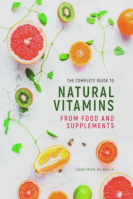 |
Full Title: | The Complete Guide to Natural Vitamins from Food and Supplements |
|---|---|---|
| Author(s): | Lizzie Streit, M.S., R.D.N., L.D. | |
| Publishing / Edition: | New Burlington Books, 2021 |
 |
Full Title: | The Complete Guide to Natural Vitamins from Food and Supplements |
|---|---|---|
| Author(s): | Lizzie Streit, M.S., R.D.N., L.D. | |
| Publishing / Edition: | New Burlington Books, 2021 |
| General Name | Chemical Name | Solubility |
|---|---|---|
| A | Retinol | Fat |
| B1 | Thiamin | Water |
| B2 | Riboflavin | Water |
| B3 | Niacin | Water |
| B5 | Pantothenic Acid | Water |
| B6 | Pyridoxine | Water |
| B9 | Folate | Water |
| B12 | Cobalamin | Water |
| B | Biotin | Water |
| * | Choline | Water |
| C | Ascorbic Acid | Water |
| D | Calciferol | Fat |
| E | Tocopherols (Alpha, in particular) | Fat |
| K | Phylloquinones (K1), Menaquinones (K2), etc. | Fat |
| Name | Type |
|---|---|
| Calcium | Major |
| Chloride | Trace |
| Chromium | Trace |
| Copper | Trace |
| Fluoride | Trace |
| Iodine | Trace |
| Iron | Trace |
| Magnesium | Major |
| Manganese | Trace |
| Molybdenum | Trace |
| Phosphorus | Major |
| Potassium | Major |
| Selenium | Trace |
| Sodium | Major |
| Sulfur | Trace |
| Zinc | Trace |